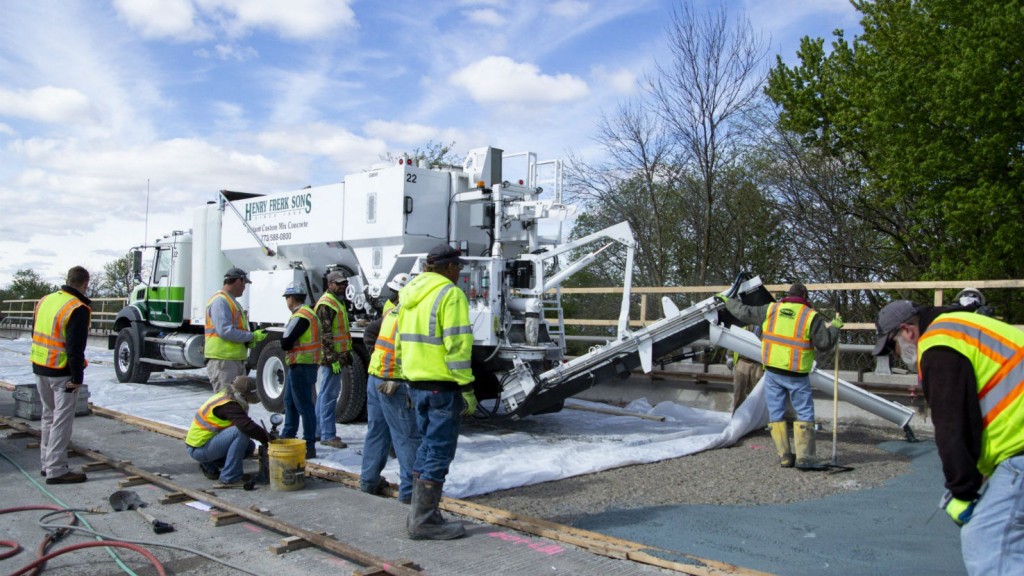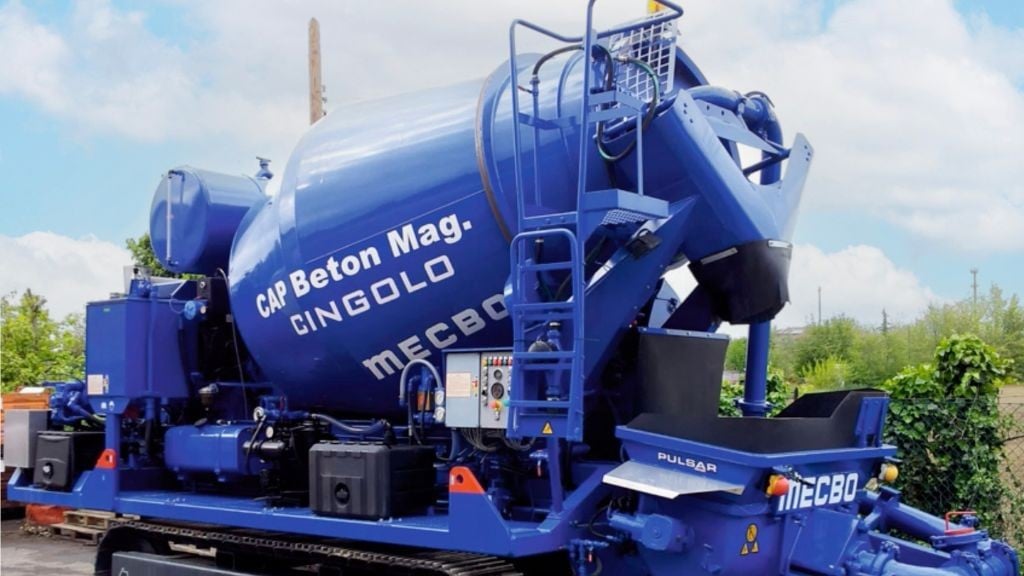
Concrete is part of many projects, from landscaping design up to road construction, and each time that concrete is called for in a contract, the challenge faced by contractors boils down to one word: time. Concrete is fickle – it must arrive at the jobsite when it's needed, be poured quickly and finished properly.
Relying on the local ready-mix trucks to deliver concrete to the right place at the right time can be nerve-racking – everything from weather changes to heavy traffic can cause problems. Smaller jobs may pay big money for a load of concrete they will only use a portion of.
A solution to this dilemma has been around for some five decades, and today it's drawing more interest from a variety of contractors interested in reducing their concrete costs – while potentially making more money. Volumetric mixing has begun to grow in popularity, and more companies are purchasing mixers that can bring on-demand concrete to their jobsites as well as others around them.
Travelling concrete plants
Volumetric mixers are basically travelling concrete plants that carry the necessary materials along with them to the jobsite, according to Mark Rinehart, director of sales and marketing with Cemen Tech. That makes for a unique opportunity to reduce costs and add potential revenue to a company's bottom line.
"This is a technology that's been around for almost 50 years, but it's really been used in specialty applications or retail concrete delivery up to this point. I think contractors themselves, the guys that have been purchasing ready-mix concrete every day, have realized that there's another option out there," Rinehart described.
In many cases, ready-mix companies control all concrete production in a particular area, and contractors must follow the plant's requirements when they buy their material. In many cases, they may have to pick up more than they need.
"Traditionally, the ready-mix company wants to do full loads, or they have a minimum – a lot of places around here will have a six-yard minimum, so even if you need two yards you pay for six," Rinehart explained. "Basically, they're going to take that additional four yards back to the yard and pour blocks, or they're going to sell it to another customer down the road."
Volumetric mixing takes the process of blending the various materials that go into concrete and brings it to the jobsite, rather than doing that job at the ready-mix plant, Rinehart explained.
"We have all the ingredients to make concrete in separate compartments on the truck so that none of the mixing takes place until we get to the jobsite. At that point, everything is done by volume," he said. "It's like your gas pump – you don't pay for how many pounds of gas you get every day, you pay for how many gallons or litres that you purchase every time. We calibrate our trucks so that we know if it runs for one minute you're going to have X pounds of sand or stone running through that truck."
Volumetric mixer trucks hold the materials to produce between 8 and 10 cubic yards of concrete without refills, Rinehart said. The truck is designed around a bin that is split between sand and stone that sits on a conveyor belt running the length of the truck; the material moves along the belt into a mixer where cement powder and water is added from other bins. Chemicals can be added depending on the needs of the pour as well.
A high-speed auger blends the material, and within seconds fresh concrete is ready to be poured in precisely the amount required.
Customize pours with ease
Customizing a pour for the job is as simple as changing a few settings, Rinehart explained.
"With a volumetric mixer, you can change the type of concrete you want to pour in a matter of seconds – with our automated gate system it automatically adjusts to where it needs to be. You hit the green button and hit start, and the unit will produce concrete in the exact moment and type that's required," he said. "That's a huge advantage – with ready-mix trucks, that would be two different trucks. . . we can do five different types of concrete with the same load."
Ten yards of concrete is a good amount for many pours that would be done on infrastructure jobs, residential, road construction, sewer and water as well as other situations, and if there's a stockpile of material available at the jobsite the truck can be reloaded easily for even more on-site concrete production. Cemen Tech trucks are available in sizes down to three yards if the contractor needs a smaller machine as well, Rinehart said.
On-site production of concrete is just one of the benefits that a volumetric mixer can bring to a contractor; the addition of a new revenue stream can be a big draw as well. Many contractors use their trucks to service their own jobs, and then hire out for small batch concrete delivery at other sites in their areas, Rinehart noted.
"Typically a contractor will buy a unit to feed his own projects and then he'll get a call from another guy down the street asking ‘hey, can you deliver me some concrete too? I don't want to wait a week or two for concrete,'" he described. "He does that, then he adds a few more trucks and now he has a whole retail concrete delivery business secondary to his excavation business. It's a perfect way to diversify and cut your material costs."
New income for contractors
Another area that Cemen Tech is targeting is asphalt contractors, who normally have to subcontract concrete work on road jobs. A visit to the 2019 World of Asphalt trade show provided them an opportunity to share that message.
"Asphalt guys do a lot of road repair, but typically sub out that concrete work – now you have a tool so you don't need to sub out, you can do it yourself and you're completely diversified," Rinehart pointed out.
"When you have an asphalt business and a concrete business, when the next recession hits that diversity will really help."
Along with contractors in the sewer and water, bridge and road repair, telecom and other industries, municipalities are also looking at the benefits of having a volumetric mixer or two in the fleet.
"A lot of cities are getting mixers themselves to do repair work around town - curbs, sidewalks, the things that are broken and constantly needing repair. When a city buys one of our units, the return on investment is typically under two years," he said. "There's an endless supply of work that cities have in front of them to keep roads maintained – that infrastructure needs to be in shape."
Canadian contractors will have a new source for volumetric mixers thanks to a recently launched partnership between Cemen Tech and SMS Equipment.
"We're really excited to see what the potential is up there. Having a nationwide dealer in Canada that's engaged with all of our target markets is exciting," Rinehart said.
Canada has plenty of potential sites where volumetric mixing will benefit contractors, including remote locations, he added. "You aren't tied within a distance from the batch plant like drum trucks are – now, you can go out into remote areas and pour concrete for a number of different applications easily."



